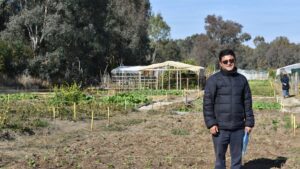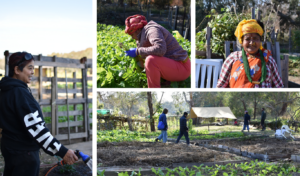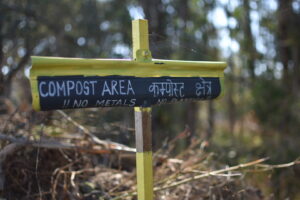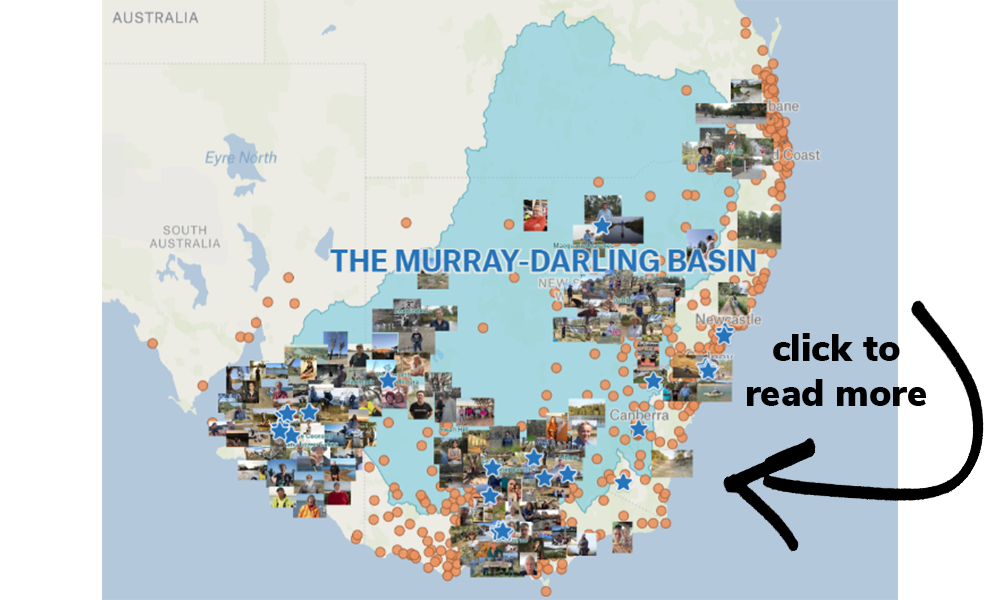At this small community farm in Wodonga, the Murray River helps to grow food, culture and connection.
Harka Bista has a contagious enthusiasm. As he weaves through the small family plots at the Bhutanese Community Farm, he strikes up conversations with the different people we pass, seamlessly translating between languages. He points out the hundreds of different fruit, vegetables and herbs that are growing – sugar cane, banana palms, choko, beans, mustard leaves, chilli, radish, onion, garlic, coriander and more. He speaks about his passion for the community space he now helps to run.
“We don’t have a profit for this farm, but we have a profit if people are happy and connected. We want to create a space that’s inclusive and increases connections in community.”

Harka Bista standing in front of some of the plots at the Bhutanese Community Garden
The Bhutanese Community Farm is located alongside the banks of the Murray River in Wodonga. The farm was started in 2013 as a small project by the Bhutanese Community of Albury Wodonga to build a sense of belonging for the newly arrived migrant and refugee population. With the support of the Wodonga City Council it was formally established in 2015. It has also received considerable support from the National Environment Centre, Riverina TAFE, Parklands Albury Wodonga, E-Works Employment service, and local businesses and organisations.
Since 2015, the farm has expanded to more than 200 individual plots and welcomed many other multicultural communities from the area, including Congolese, Filipino, Indian, Nepali, Iran, Bhutanese and Baha’i. The farm has become a central place for these communities to meet, socialize and share skills, seeds, meals, culture and language. As Harka explains, “they grow, they eat, they share, they donate.”
The Murray River runs alongside the farm and plays a big role in how people garden and connect with the space. For $20 a year per plot, families can take water from the river to water their plots through irrigation infrastructure. All farming is organic, to prevent any pesticides running into the river. Giant old river red gums are dotted around the farm, providing shade and habitat for the many birds that keep farmers company with their birdsong. The river is a constant, calming presence.
Harka says it has made a positive difference for people by improving their self-esteem, healing mental health and helping them feel part of a community. “People say to me ‘I don’t have to take medicine anymore because I feel good coming here’”.

However, its proximity to the river also means the farm is vulnerable to flooding. In 2022, major flooding destroyed all the plots and infrastructure on the farm. It was this moment that made Harka decide to join the management team and he has been Secretary since November 2023.
Harka has lived in Albury with his family since 2010. After leaving Bhutan when he was 18, he spent nearly two decades living in a refugee camp in Nepal before finally settling in country NSW. Volunteering at the Bhutanese Community Farm is Harka’s way of giving back. “I always tell my generation – give something back to the country and community.”
It’s this sense of community that binds the Bhutanese Community Farm together. People come to grow food but leave with so much more.
Together with the Murray Art Museum Albury (MAMA), the farm has run 5-day workshops for farm members including composting, bread making and curry making. They have organised events for the wider Albury-Wodonga community by cooking meals with vegetables grown on the farm and donated more than 3000 meals to local charities. Harka is also particularly proud of how the Bhutanese Community of Albury Wodonga and farm members donated food and raised $8,000 for the local fire brigade and community after the 2019/20 bushfires.
Harka would like to acknowledge the landowner Wodonga City Council for providing such a great space to the community of Albury Wodonga. “This project has been a success with their help, and we are sincerely grateful for it.”

